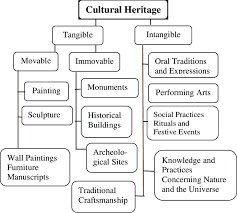The Importance of Preserving Cultural Heritage
Cultural heritage is the legacy of physical artifacts and intangible attributes of a group or society that are inherited from past generations. It is a vital component of our identity, providing us with a sense of belonging and continuity in an ever-changing world.
Preserving cultural heritage is crucial for several reasons. Firstly, it helps us understand our history and origins. By safeguarding ancient monuments, traditional practices, languages, and customs, we can learn about the evolution of human societies and appreciate the diversity that enriches our global community.
Furthermore, cultural heritage plays a significant role in fostering social cohesion and promoting intercultural dialogue. When we preserve and celebrate our traditions, we create opportunities for mutual respect and understanding among different communities. This shared heritage can bridge divides, promote tolerance, and contribute to peaceful coexistence.
In addition to its social benefits, cultural heritage also has economic value. Historic sites, museums, festivals, and cultural events attract tourists from around the world, generating revenue and creating jobs in local communities. By investing in the preservation of cultural heritage, we can stimulate economic growth while safeguarding our collective memory for future generations.
However, preserving cultural heritage is not without challenges. Rapid urbanization, natural disasters, armed conflicts, climate change, and neglect pose significant threats to our shared legacy. It requires concerted efforts from governments, communities, institutions, and individuals to protect and conserve our cultural treasures for posterity.
In conclusion, cultural heritage is a precious resource that enriches our lives in myriad ways. By recognising its importance and taking proactive measures to safeguard it, we can ensure that future generations inherit a world rich in history, diversity, and meaning.
Embracing Cultural Heritage: Six Tips for Appreciation and Preservation
- Respect and appreciate different cultural heritage.
- Learn about the history and significance of cultural heritage sites.
- Support efforts to preserve and protect cultural heritage for future generations.
- Engage in cultural activities and events to experience diverse heritages.
- Share knowledge about your own cultural heritage with others.
- Be open-minded and willing to learn from different cultural traditions.
Respect and appreciate different cultural heritage.
Respecting and appreciating different cultural heritage is essential in fostering a more inclusive and harmonious society. By acknowledging the unique traditions, beliefs, and practices of diverse cultures, we not only show respect for others but also enrich our own understanding of the world. Embracing cultural diversity promotes empathy, tolerance, and open-mindedness, creating a more interconnected global community where individuals can learn from each other’s rich heritage and build bridges across cultural divides.
Learn about the history and significance of cultural heritage sites.
To truly appreciate and honour cultural heritage sites, it is essential to delve into their history and understand their significance. By learning about the stories, traditions, and events that have shaped these sites over time, we can gain a deeper appreciation for their cultural value and the role they play in our collective heritage. Studying the history of cultural heritage sites allows us to connect with the past, appreciate the craftsmanship of our ancestors, and recognise the importance of preserving these treasures for future generations to cherish and learn from.
Support efforts to preserve and protect cultural heritage for future generations.
Supporting efforts to preserve and protect cultural heritage is essential for ensuring that future generations inherit a world rich in history, diversity, and meaning. By actively engaging in initiatives that safeguard ancient monuments, traditional practices, languages, and customs, we contribute to the continuity of our collective identity and heritage. Through our support, we can help maintain a connection to our past, promote intercultural dialogue, and foster a sense of pride and belonging in the diverse tapestry of human history. Let us join hands to preserve our cultural treasures for the benefit of generations to come.
Engage in cultural activities and events to experience diverse heritages.
Engaging in cultural activities and events is a wonderful way to immerse oneself in diverse heritages and gain a deeper appreciation for the richness of our world’s cultural tapestry. By participating in traditional festivals, art exhibitions, music performances, and other cultural events, individuals can not only learn about different customs and practices but also forge connections with people from various backgrounds. These experiences provide valuable insights into the values, beliefs, and traditions that shape different societies, fostering empathy, understanding, and respect for our shared cultural heritage.
Share knowledge about your own cultural heritage with others.
Sharing knowledge about your own cultural heritage with others is a powerful way to celebrate diversity and foster understanding. By sharing stories, traditions, and customs from your cultural background, you not only preserve your heritage but also enrich the lives of those around you. Through open dialogue and exchange, we can break down barriers, promote inclusivity, and build connections that transcend differences. Embracing the opportunity to share your cultural heritage can spark curiosity, inspire learning, and create a more vibrant tapestry of shared experiences within our global community.
Be open-minded and willing to learn from different cultural traditions.
To truly appreciate and preserve cultural heritage, it is essential to adopt an open-minded attitude and a willingness to learn from diverse cultural traditions. By embracing different customs, beliefs, and practices, we not only enrich our own understanding of the world but also foster mutual respect and empathy towards others. Being open-minded allows us to engage with unfamiliar perspectives, broaden our horizons, and forge meaningful connections across borders. In this way, we can celebrate the richness of cultural diversity and contribute to the preservation of our shared heritage for generations to come.

